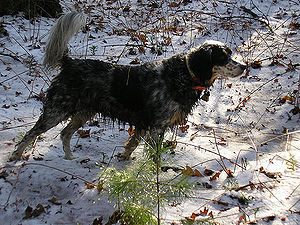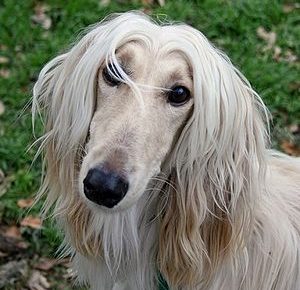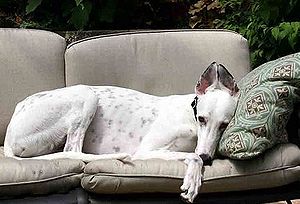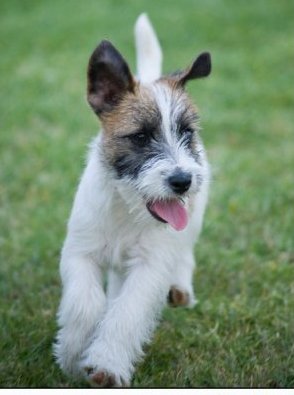 |
| Vital Statistics: |
| Place of Origin: England |
| Group: Gun dog |
| Height: 22-24 in. |
| Weight: males, 45-60 lbs., females, 35-50 lbs. |
| Life span: 10-12 yrs. |
| Trainability: moderate |
| Good with children: yes |
| Good with other pets: with house pets & early socialization, but high prey drive makes them unpredictable. |
What is the origin of the Llewellyn Setter?
The Llewellyn (or Llewellin) Setter’s bloodlines can be traced back to the 1860s. Sportsman R.L. Purcell Llewellin, considered by some as eccentric, was an avid bird hunter, developed this setter for field work. Llewellins are separate from English Setters although sometimes misakenly lumped together. Llewellyns are descended from the oldest breed of setters known since the 1500s. They are considered by many as the ultimate gun dog.
What does the Llewellyn Setter look like?
Llewellins are 22-24 inches tall. Males weigh 45-60 lbs., females are 35-50 lbs. Ears are pendant. The tail is carried high. Coat is single and flat, straight and medium long with feathering on the ears, tail and legs. Colors are white with colored patches and ticked. Belton (meaning ticking with no spots) coloring is blue and orange with no spots. Coat should be brushed daily. Check ears regularly.
What is the temperament of the Llewellyn Setter?
The Llewellyn Setter is an intelligent dog, eager to please, natuarlly non-aggressive. But as with all dogs, they should have early obedience training and socialization. They are very sensitive to harsh commands and should have positive training. They are excellent with children. Llewellyns have good dispositions, are very affectionate and like to cuddle. They have a high prey drive and may not be good with small animals, but get along with other dogs and cats. Llewellyns need vigorous exercise and a good run in a safe area. They are better suited to living in a house with a good-sized yard and a secure fence.
What are Llewellyn Setters used for?
Llewellyns are excellent gun dogs used to hunt birds. They excel in field trials.
Most of all they are loving, affectionate family members
Possible Health Issues
Hip/elbow dysplasia, deafness, hypothyroidism, eye diseases, allergies, umbilical hernia, cryptorchidism (failure of testicles to descend).
- American Cocker Spaniel
- Boykin Spaniel
- Bracco Italiano
- Brittany Spaniel
- Chesapeake Bay Retriever
- Clumber Spaniel
- Curly-coated Retriever
- Dalmatian
- English Setter
- English Springer Spaniel
- German Shorthaired Pointer
- Gordon Setter
- Irish Red & White Setter
- Japanese Akita Inu
- Kai Ken Dog
- Karelian Bear Dog
- Labrador Retriever
- Lagotto Romagnolo
- Mountain Cur
- Nova Scotia Duck Tolling Retriever
- Picardy Spaniel
- Pudelpointer
- Russian Spaniel
- Spinone Italiano
- Vizsla
- Weimaraner
- Welsh Springer Spaniel
- Welsh Terrier
- Wetterhoun
- Wirehaired Pointing Griffon
- Wirehaired Vizsla
- Airedale Terrier
- Beagle
- Bedlington Terrier
- Bluetick Coonhound
- Border Collie
- Border Terrier
- Bull Terrier
- Bulldog
- Bullmastiff
- Ca de Bou
- Cavalier King Charles Spaniel
- Clumber Spaniel
- Collie
- Curly-coated Retriever
- Dandie Dinmont Terrier
- English Cocker Spaniel
- English Foxhound
- English Setter
- English Springer Spaniel
- English Toy Terrier
- Flat-coated Retriever
- Golden Retriever
- Greyhound
- Harrier
- Jack Russell Terrier
- Lakeland Terrier
- Lancashire Heeler
- Manchester Terrier
- Mastiff
- Norfolk Terrier and Norwich Terrier
- Old English Sheepdog
- Old English Terrier
- Otterhound
- Parson Russell Terrier
- Shetland Sheepdog
- Smooth and Wire-haired Fox Terrier
- Sussex Spaniel
- Welsh Terrier
- Whippet
- Wire Fox Terrier
- Yorkshire Terrier



